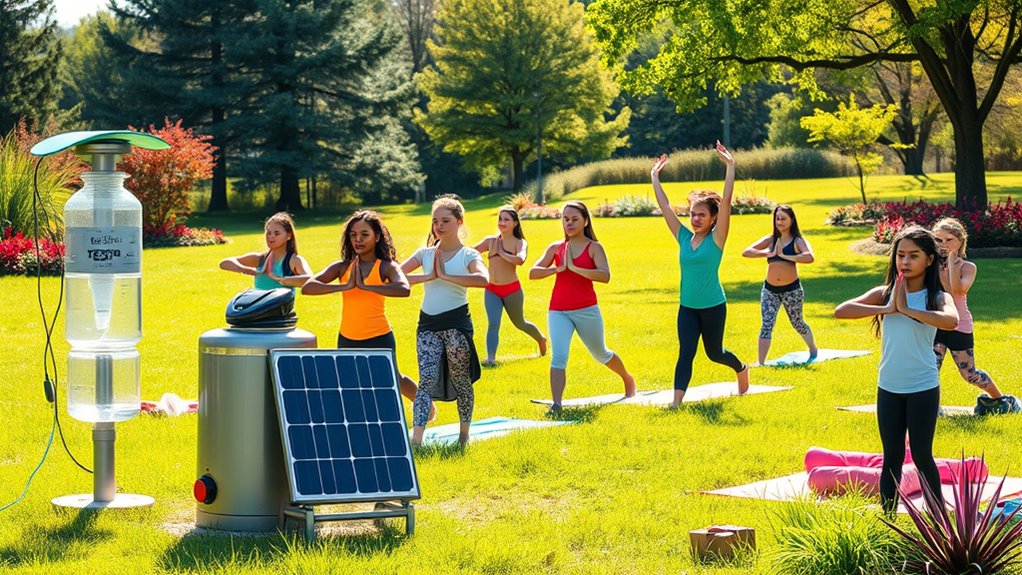Supporting adolescent health today means focusing on both mental and physical wellness. You can help teens by encouraging open conversations about mental health, promoting positive online habits, and being aware of social media’s influence. It’s important to foster resilience, advocate for mental health resources, and create supportive environments. By understanding these trends, you’ll discover effective ways to empower teens to thrive amid modern challenges—if you continue, you’ll find more helpful insights.
Key Takeaways
- Emphasizing mental health awareness and reducing stigma through school, community, and workplace programs.
- Utilizing social media platforms to share experiences, access resources, and foster peer support.
- Promoting healthy online habits by setting boundaries and critically evaluating curated content.
- Encouraging proactive mental health practices like mindfulness, journaling, and seeking professional counseling.
- Supporting resilience and balance through self-care, emotional awareness, and healthy lifestyle choices.

In recent years, teen wellness trends have shifted markedly as young people become more aware of the importance of mental and physical health. You’re likely noticing that mental health now takes center stage in conversations about adolescent well-being. Social media plays a significant role in this shift—both positively and negatively. On one hand, platforms like TikTok, Instagram, and Twitter allow teens to share their experiences, connect with others facing similar struggles, and access mental health resources. These online spaces foster a sense of community that wasn’t as easily accessible before, helping you realize you’re not alone in your challenges. Many teens find comfort in following mental health advocates, reading stories of resilience, and gaining tips for managing stress and anxiety—all through social media. However, these platforms can also contribute to mental health issues if you’re not careful. The constant stream of curated images and idealized lifestyles can lead to comparisons, self-doubt, and feelings of inadequacy. It’s important to approach social media mindfully, recognizing that what you see isn’t always an accurate reflection of reality. Setting boundaries around your social media use can help protect your mental health, like limiting screen time or unfollowing accounts that make you feel worse about yourself. Additionally, understanding the impact of AI bias in digital content can help you critically evaluate what you encounter online. You’re also probably aware that prioritizing mental health is becoming more accepted and encouraged. Schools, communities, and even workplaces are introducing programs that promote mental wellness. You might be participating in mindfulness exercises, journaling, or seeking counseling services more openly now than in the past. These efforts aim to normalize conversations around mental health and reduce stigma. It’s essential that you take proactive steps to support your mental health—whether that’s talking to trusted friends or family, practicing self-care, or seeking professional help if needed. Recognizing signs of stress, anxiety, or depression early can make a big difference, and knowing where to turn for support can empower you to handle challenges more effectively. Ultimately, the trend toward focusing on mental health reflects a broader understanding that well-being isn’t just about physical health but also about emotional resilience. Social media, while offering valuable connections and information, requires careful navigation. By being aware of its influence and actively engaging in practices that bolster your mental health, you can foster a healthier, more balanced lifestyle. This balance is key for teens like you to thrive amid the pressures of modern life, feeling supported, understood, and empowered every step of the way.
Top picks for "teen wellnes trend"
Open Amazon search results for this keyword.
As an affiliate, we earn on qualifying purchases.
Frequently Asked Questions
How Can Parents Effectively Communicate With Teens About Mental Health?
You can effectively talk to your teen about mental health by building trust first. Show genuine interest and avoid judgment to make them feel safe. Practice active listening, giving your full attention and validating their feelings. Ask open-ended questions to encourage sharing, and be patient. Remember, consistent, honest conversations help your teen feel supported, making it easier for them to open up about their mental health concerns.
What Are the Signs of Burnout in Adolescents?
Like a candle burning at both ends, adolescents often show warning signs of burnout. You’ll notice emotional exhaustion, such as irritability, withdrawal, or a lack of motivation. They might struggle to focus, feel overwhelmed, or lose interest in activities they once enjoyed. Keep an eye out for mood swings and declining academic performance. Recognizing these signs early helps you support their mental health and prevent further exhaustion.
How Does Social Media Impact Teen Wellness?
Social media influence can markedly affect your teen wellness by impacting your self-esteem and mental health. Constant exposure to curated content may lead to comparison, anxiety, or depression. To maintain balance, consider a digital detox, taking breaks from screens to reconnect with real-life experiences. This helps reduce stress, improve sleep, and foster healthier relationships, ensuring social media supports rather than hinders your overall well-being.
What Role Do Schools Play in Supporting Adolescent Health?
You play a vital role in supporting adolescent health by advocating for strong school policies that promote mental and physical well-being. Schools can also foster peer support programs, creating safe spaces where students feel empowered to share their concerns. Your involvement helps guarantee that students have access to resources, guidance, and a supportive environment, ultimately encouraging healthier choices and resilience during these critical developmental years.
Are There Specific Nutrition Tips for Teen Mental Well-Being?
Your brain’s like a supercomputer, so fueling it well is essential! To boost your mental health, focus on a balanced diet rich in fruits, veggies, and omega-3s. Practice mindful eating—pay attention to your hunger cues and savor your food—this helps reduce stress and improve mood. Avoid sugary snacks and processed foods, which can cause mood swings. Remember, nourishing your body supports your mind just as much as your body!
Conclusion
As you embrace teen wellness trends, remember that balancing technology with outdoor activities, mindfulness with social connections, creates a healthier life. While screens offer connection, real moments forge deeper bonds. As routines shift from fast-paced to mindful, you find strength in both. In this dance of balance and chaos, your choices shape your well-being. Embrace change, stay grounded, and realize that supporting your health is both a journey and a destination.









